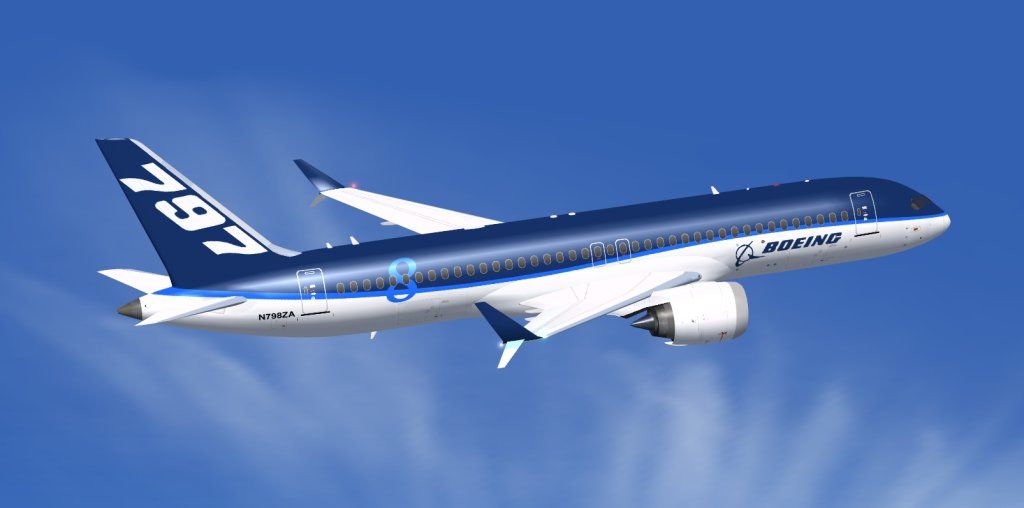Right now, the Boeing 797 is a ‘paper plane’ – a concept existing purely in hand-drawn sketches and digital pixels.
But the aircraft manufacturer could greenlight its next-gen jetliner as early as next year, with first commercial flights in 2025.
Boeing will position the 797 between the largest Boeing 737 jets – such as those which form the backbone of the domestic Qantas and Virgin Australia fleet – and the smallest Boeing 787-8 Dreamliner.
The seat count of the twin-aisle Boeing 797 is expected to be around 225 passengers assuming a two-class layout of business and economy, or as many as 260 in the all-economy floorpan favoured by low-cost airlines, with airlines offered two variants of the 797.
"One will be bigger and fly not quite as far, one will be smaller and fly farther," Boeing marketing vice president Randy Tinseth told Bloomberg.
Evolution of the Boeing 797
Boeing first went public with its plans at the 2015 Paris Air Show, using generic descriptors of a MOM jet (Middle of Market) or the Boeing NMA (meaning either New Mid-sized Airplane or New Market Airplane) with a medium range of about 8,400km (5,200 miles).
However Air Lease CEO Steven Udvar-Hazy, who is described as being “influential in shaping product strategy for Boeing and Airbus”, says that Boeing will christen its newest model as the 797 and create a clean-sheet design drawing on its experience with the 737MAX and 787 Dreamliner series.
“Call it a 797,” Udvar-Hazy says, “that’s what it’s going to be.”
Hitting the Trans-Atlantic sweet spot
A large slice of the Boeing 797’s market will be direct trans-Atlantic routes between the US and Europe: a corridor which low-cost airlines are seeking to dominate through the combination of cheap fares and relatively short travel times (by Australian standards, anyway).
The 797 “could be the airplane that creates the next phase of growth for the low-cost carriers” adds Air Lease exec John Plueger.
However, stung by the soaring costs and extensive delays in creating the 787 Dreamliner, Boeing is understandably wary of another ‘moonshot’ project such as the 797. Bank of America / Merrill Lynch predicts total development costs will range from US$10 billion to US$15 billion.
And Air Lease chief Udvar-Hazy remains to be convinced that Boeing has nailed the balance of price, performance and production costs.
“Boeing has to really wrestle with that issue… the cost of developing and manufacturing the airplane at a price that gives the airlines value, I don’t think that equation has been solved.”
Airbus opts for evolution, not revolution
Arch-rival Airbus has chosen the safer and less expensive path of improving its existing catalogue through NEO or ‘new engine option’ models of the A320 and A330 series.
These combine efficient new engines with tweaks in aerodynamics, engineering and cabin design to lower the operating cost while increase the passenger count.
However, United Airlines has already examined Boeing’s paper plan and likes what it sees.
“What we’ve seen so far is very, very interesting to us,” United chief financial officer Andrew Levy told Bloomberg. “We certainly hope Boeing launches the airplane. We think there is a need for it.”


Qantas - Qantas Frequent Flyer
18 May 2011
Total posts 233
It makes you wonder why they don't just bring back the 757 but with better aerodynamics (new wings), better materials (carbon fuselage) and much better engines.
But I've ready the likely final configuration could actually be a dual isle plane instead of the single isle.
It certainly is interesting.
20 May 2015
Total posts 579
"It makes you wonder why they don't just bring back the 757"
The MoM is really the 'shorter range 767' market for the most part, and whilst the 787-8 is a fantastic replacement/upgrade for the longer range 767s (and a replacement for A330-200s on long-range routes), it is too much airplane for many transatlantic services.
Qantas - Qantas Frequent Flyer
11 Oct 2014
Total posts 687
One really has to wonder if Boeing's abrupt termination of the B787-3 was such a 'smart' idea after all? That model represented a dual aisle, bottom of the B787 market specification that could now be modified to reduce the weight of the wheel box(es) at considerably less cost than an all new clean-sheet design. And of course, it would have total compatibility with it's larger siblings. Not to mention the economics of scale with production on an existing line.
20 May 2015
Total posts 579
I think that the 787-3 was too heavy for a MoM plane. Also, it was designed specifically for the Japanese market but both JAL and ANA retain extensive 767-300 fleets in domestic configurations.
23 Feb 2015
Total posts 260
Will this mean all the 7X7 combinations will have been used? I wonder where they go next. Not all that important I know, small things I guess!
20 May 2015
Total posts 579
Letters as the middle digit. Maybe Symbols if they want to be all "Artist Formerly Known As Prince" about things.
7$7, 7@7, 7:)7 maybe. Who knows what marketing will do!
23 Feb 2015
Total posts 260
Lol - could be good fun...
Qantas - Qantas Frequent Flyer
15 Mar 2016
Total posts 167
If they incorporate all the features that make the 787 a more comfortable flight then this will be great for TA or even trans pacific routes. Don't know why they wouldn't use that technology now they have it!
20 May 2015
Total posts 579
I would've thought Boeing would've wanted to develop a MoM and NSA (i.e. 737 replacement) at the same time... but I guess they didn't want to cannibalize 737 MAX sales.
This jet would be great for shorter-range higher-density routes. I could see QF and Virgin interested in it, absolutely.
12 Mar 2017
Total posts 1
If it ain't Boeing, I ain't going...
Virgin Australia - Velocity Rewards
16 Dec 2015
Total posts 41
It's a very interesting development, given all of the noise Boeing made publicly about their Yellowstone project and the 787 being identified as Y2 and the 777X widely considered to be the manifestation of Y3.
Virgin Australia - Velocity Rewards
13 Jan 2015
Total posts 580
We already have a 757 (well 752 at least) replacement...it's called the A321LR
28 Dec 2016
Total posts 74
225 seats for a twin aisle? Get serious, its not going to be competitive with single aisle aircrafts with all that wasted spce
20 May 2015
Total posts 579
You're correct, but single aisle aircrafts could not reach far beyond 4000nmi with 220ish seats. The 757-200 had 221seats (single class 32" pitch) and a range of 3915nmi. The A321neoLR only has about 200 seats (single glass 32" pitch) and a range of 4000nmi with auxiliary fuel tanks installed. And the A321neoLR has what is basically the most advanced engine currently available for narrowbodies on it.
08 Oct 2011
Total posts 49
The old B707-320 did have at least 5000nm range. And sizewise it is as big as B757-200. But wonder why B707 can only carry about 150 pax.
11 Dec 2015
Total posts 85
If they stick to the typical 767 layout of 2-3-2 but with a little extra cabin width this could actually end up being a far nicer place for economy passengers to be than the Dreamliner's cramped 9-abreast layout
23 Feb 2015
Total posts 260
I do miss the 767 layout on the MEL-SYD route.
Air New Zealand - Airpoints
21 Jan 2016
Total posts 193
I don't see the Boeing Board going for a B797 model, as they have already spent to much money on R&D for the B787 project.
Apparently, the B783 was designed to operate on B753 and B762 routes but Boeing managed to convince Japan Airlines and ANA to switch their B783 orders to B788's.
Boeing withdrew the B783 from the product range Dec 2010 as they struggled with the production of the B788 which was 3 years behind schedule.
United needs to replace B757/B767 fleets so the B783 could be added to the B787 product range for those airlines who are still operating B757/B767's.
According to Bloomberg, Airbus could introduce a A322neo to the A320neo product range which would fit the B757 market. Boeing doesn't have a product similar to the A321 except for the proposed B737-Max10 concept.
I will be interesting to see what happens.
12 Dec 2012
Total posts 1031
Sounds like this is another announcement of the Y1.
Boeing is running the "Yellowstone Project". 3 aircraft meant to replace their existing, in 2003, product lineup.
Y1 is meant to cover the 100-250 seat market to replace the 737, 757 and 762.
Y2 is the 787.
Y3 is for the 350-600+ seat market, to replace the 777 and 747. Work on Y3 was postponed with the 777X announcement.
Qantas - Qantas Frequent Flyer
23 Sep 2017
Total posts 164
I would hope it’s a smaller WB jet rather than just another claustrophobic, longer, skinny NB.
Hi Guest, join in the discussion on Boeing 797 will be a mid-sized mass-market jetliner